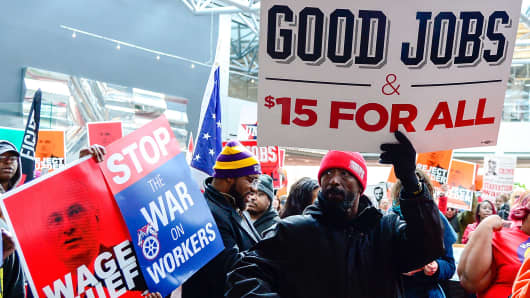Thousands of minimum wage workers in Missouri became the latest target in a string of successful attacks across the country from states, mostly in the Midwest and South, banning cities from passing progressive legislation, striking down the hope of better living conditions for low-income workers.
This happened in Alabama last year when then Governor Robert Bentley signed a law nullifying a Birmingham ordinance to raise the city's wage to $10.10. In Ohio, Governor John Kasich signed a minimum wage preemption law to block a local minimum wage proposal in Cleveland that would have been placed on the ballot in a special election in 2017.
The practice of allowing state governments to block local ordinances is called preemption and beyond its anti-democratic implications, preemption has troubling racial overtones. Preemption has been orchestrated by predominantly white, Republican legislatures to roll back local policies that generally benefit communities of color.
For example, 89 percent of Missouri's state legislature is white while half of St. Louis' population is Black. Likewise, in Ohio, the state legislature is almost 90 percent white, while 53 percent of Cleveland population is Black. And nearly 75 percent of Birmingham's population in Black while the state legislature is 75 percent white.
Preemption is on the rise nationwide. In the past year and a half alone, 15 states have passed 28 laws preempting local labor standards. According to the Economic Policy Institute (EPI), state preemption laws target five key areas: minimum wage, paid leave, fair work schedules, prevailing wages, and project labor agreements.
Red states are particularly vulnerable to this trend. In 33 states, the Republican Party controls the governorship and has majority representation in both chambers of most state legislatures, according to the Economic Policy Institute.
Preemption is being used as a tool by politicians to advance an agenda that permanently disempowers people of color and immigrants.
Women and people of color are already overrepresented in jobs that pay less than $15 per hour. More than half of all Black workers and 59 percent of all Latino workers in America work minimum wage jobs.
These economic inequalities have contributed to the shrinking of wealth for Black and Latino families. In fact, a recent study found that Black wealth will "fall to zero by 2053" as a result of a "huge and growing" racial disparity that could be disastrous for the middle class. More alarming, the study projects that in just three years from now, white households will own 86 times more wealth than black households, and 68 times more wealth than Latino households.
The move by state legislatures to quash wage hikes is remarkably short-sighted because it's not only Black and Latino workers that benefit from higher wages. The white working class who famously helped put Trump in office also have seen their wages stagnate for decades.
We have made too much progress to go back now. In the absence of federal action, as of 2017, 21 states and Washington D.C. and 22 cities have taken the initiative to raise their minimum wage and 30 cities have passed paid sick leave.
But we must remain vigilant. Republican-led governments are trying to find any way to use corporate-backed power to keep Black and Latino workers in poverty. Not only will we continue to fight locally for progressive legislation and dignity for workers, we will call out these covert policies for what they are - racist tools to prevent workers from thriving.
Commentary by JoEllen Chernow, director of economic justice at Center for Popular Democracy.
For more insight from CNBC contributors, follow
@CNBCopinion
on Twitter.


